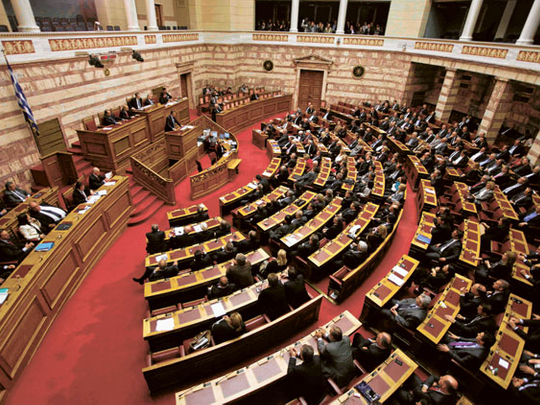
Athens: Greek lawmakers early yesterday approved an austerity budget, part of a tough economic overhaul imposed after the debt-hit country's international bailout, as thousands of protesters marched in Athens.
Some 3,000 unionists and Communists staged separate demonstrations on Wednesday to reject the economic blueprint containing over €14 billion (Dh67.3 billion) in savings for 2011 in a bid to restore balance to Greece's woeful public finances.
After five days of debates the budget was adopted by 156 votes to 142, with the ruling socialist Pasok in favour and the rightist New Democracy, communists, radical left and extreme right voting against.
The 2011 budget includes cuts in the badly mismanaged Greek health sector and state-owned companies, a two per cent increase in the lower sales tax rate from 11 to 13 per cent, a tax evasion crackdown, lower defence spending and a pensions freeze.
Prime Minister George Papandreou told parliament he was "determined" to make all the changes needed to pull the country out of crisis, saying: "Despite the difficulties I am optimistic, Greece will not go bankrupt." He added in a televised speech: "Without the aid of the European mechanism, the country would have collapsed."
Papandreou appealed to all the opposition parties to "assume their responsibilities" and contribute to efforts to save the economy.
As the protesters marched on Wednesday the streets of the capital were already clogged with traffic due to a public transport strike — the fourth this month — against wage cuts and parts of the city were overflowing with rubbish after a sanitation walkout.
"The government is trying to pit social groups against each other," senior bus unionist Nikos Kouloumbaritsis told Flash Radio. "We have suffered five wage cuts since January, nobody can consider living on a wage of €1,000," he said.
Investors' doubt
"We are not stopping our mobilisation."
The minimum wage in Greece is €740. Investors also doubt that Greece can fulfil its promises, despite having slashed its public deficit by some six per cent of output this year.
One of the major rating agencies, Fitch, said on Tuesday it could downgrade its rating on Greece after a similar warning from another agency, Moody's, last week.
With thousands of jobs already lost, wages cut and prices climbing from tax hikes, the country's influential unions have hit back with seven general strikes this year and waves of street protests.
Fearful of further social unrest in the midst of the festive season, the government has opted to postpone to early next year a controversial reform to liberalise scores of regulated professions.
Officials say that entry or pricing restrictions in these sectors have stymied competition for decades but many of the professionals targeted in the reform, including notaries, pharmacists, engineers and architects, counter that the measures will harm service quality and have pledged to resist them.
The economic overhaul has been mandated by the European Union and the International Monetary Fund which in May extended Greece a €110-billion loan when the country came close to bankruptcy.
The money is released in instalments conditional on Greece making progress in its reforms.
Under the terms of the rescue, Greece agreed that its public deficit would be reduced to 7.6 per cent of Gross Domestic Product in 2011, aiming to eventually reach the EU limit of three per cent.
But additional measures became necessary after the 2009 public deficit was revised upwards last month to 15.4 per cent of GDP from the previously given 13.6 per cent by Eurostat, the EU statistics agency.
Raised debt insurance
Greece led an increase in the cost of insuring European sovereign debt after Fitch Ratings warned it may cut the nation's credit rating to junk.
Credit-default swaps on Greece jumped 14.5 basis points to a four-week high of 984, according to data provider CMA. The Markit iTraxx SovX Western Europe Index of swaps on 15 governments rose 2.5 basis points to 202.5, surpassing the November 30 record close.Greek debt may be downgraded to junk within six weeks after a review of its "fiscal sustainability," Fitch said.












